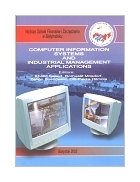The book would serve an
important role in showing what young scientists are interested in - knowing others' new
views about Computer Information Systems and Industrial Managements.
Table of Contents
FOREWORD
Chapter 1. Pattern
1.1. Likhachov D.S.,
Petrovsky A.A., Improved auditory-based speech coding using psychoacoustic model based
on a cochlear filter bank and an average localized synchrony detection.
1.2. Helo P. T., Modelling and analysing product configurations by feature based
structures.
1.3. Zieniuk E., Szerszen K., Bezier and b-spline curves in visualization and
creation of geometries in the solution of boundary problems.
1.4. Frejiichowski D., The UNL- transform applied to contour objects.
1.5. MosdorfR., Some fractal analysis aspects of numerical simulation in chaotic
dynamic systems.
1.6. Rogaiinski L.J., Motion tracking of plane objects.
1.7. Spychalski P., Hardware based pattern recognition system for quality
verification in electronic production.
1.8. Rybnik M., Chebira A., Madani K., Saeed K., Tabedzki M., Adamski M., A
Hybrid Neural Based Information Processing Approach Combining a View-Based Feature
Extractor and a Treelike Intelligent Classifier.
Chapter 2. Artificial
Intelligence
2.1. Madani K., From
Artificial Neural Network Based Technology to Real World and Real Complexity
Applications.
2.2 Wierzchon S. T., Artificial Immune Systems - a survey of applications.
2.3. Zieniuk E., Kuzelewski A., Artificial neural network in identifying of two
dimensional domains on the basis of potential distribution in inverse problems.
2.4. Relich M., Galicki M., The application of artificial feedforward neural
networks and linear econometric models in the prediction of the consumer price index.
2.5. Hiadowski L., Galkowski K., Rogers E. Repetitive processes - a way towards
modelling hybrid systems.
2.6. Karbowska J., Probabilistic iterative algorithms with continuous time
parameter.
2.7. Koszelew J., Some methods for verification of probabilistic programs
interpreted in finite structures.
2.8. Borowska A., Algorithmic information theory.
2.9. Radev S. Information granulating in magestic.
2.10. Dakowicz M., Stepaniuk J., Structured query language and tolerance rough sets
Chapter 3. Computer Security
and Safety
3.1. Adamski M., Ulacha
G., Effectivity increase ofjpeg compression by using a mixed huffman's code.
3.2. Mrozek I., Yarmolik V. N., Pattern sensitive faults detection based on
transparent march tests.
3.3. Yarmolik V.N., Portyanko S.S., State of art in software ownership
protection.
3.4. Yarmolik V. N., Buslowska E., Transformation of memory faults into
patterns of errors.
3.5. Hebisz T., Kuriata E., Jackiewicz M., Fulfillment of computer security and
safety by using symmetric-key block cryptosystem resistant to manipulations on ciphertext.
3.6. Ivaniuk A., Petronenko D.S, Sokol B., Transparent built-in
self-diagnostic algorithm for embedded RAMs
3.7. Murashko I., Puczko M., The switching activity minimization for low power BIST.
3.8. Jackiawicz M., Kuriata E., Hebisz T. Safety of key generators
Chapter 4. Medical,
Multimedia, Industrial and other Applications
4.1. Al-Tahir R.,
Saeed I., An approach for the segmentation of lidar surface data.
4.2. Barret M., Dujardin A-S., Amarger V., Madani K. Durastanti J-F, Mechanical
faults recognition using wavelet transform and artificial neural network techniques.
4.3. Boucetta R., Benrejeb M., A genetic fuzzy control of flexible 2 inverted
pendulum.
4.4. OlejnikR. Methodology of computer networks design.
4.5. Kimaczynski S., Baranczak R., Kimaczynska A., 2 Classification of
employees on defined stands with the help of artificial neural networks.
4.6. Maleika W., Lawniczak S., Investigation of compression 2 factor of data describing
sea-bottom in respect of resolution of source grid.
4.7. Oniszczuk W., Blocking and Delay Factors in Computer 2 Information Systems.
4.8. Chodakowska E., Forecasting system as a supportive 2 decision tool in
enterprises.
4.9. Filipkowski P., Signal processing in forecasting of time series.
4.10. Nazarko J., Dziekonski K., Internet as a groundwork of economic networks.
Chapter 5. Industrial
Management
5.1 Maunuksela Ari J.,
Emergence of citywide WLAN networks - some empirical findings from finnish wireless
broadband companies
5.2 Reiner G., Schodi R., Challenges of successful suplly chain design.
5.3 Nguyen Van Hop, the lot-sizing problem with fuzzy demand
5.4 Andersson T., Change of management accounting discourse, 3 A Result of
Dominating Management Ideologies
5.5 Bechina A., Piccioroaga F., Brinkshulte U., Towards a collaborative engineering
framework.
5.6 Fecikova I., Kekale T., The implications of subcultures to management of key
processes.
5.7 Fernandez I., Effects on purchasing function as a result of recovery activies.
5.8 Hernant M., Performance evaluation of grocery retail stores Non-Managerial
Determinants of Store Performance - An Empirical Study.
5.9 Olli-Pekka Hilmola, Hejazi A., Supply Chain Management Research Using Case
Study Approach.
5.10 Iwacewicz A., Conditions of development entrepreneurship on protected areas.
5.11 KIeinsmann M., Valkenburg R., Learning from collaborative new product
development projects.
5.12 Mazur B., Cultural understanding of responsibility.
5.13 Plura J., Quality Planning - the Way to Satisfied Customer and Succesful
Company.
5.14 Zgodavova K., Zaic P., Urbancikova N., Some knowledge acquired from the new
product launch process capability analysis.
5.15 Oriowska M., Financial sources of regional development in Poland.
465 stron
Księgarnia nie działa. Nie odpowiadamy na pytania i nie realizujemy zamówien. Do odwolania !.


